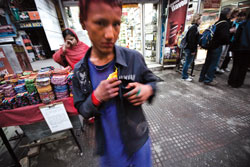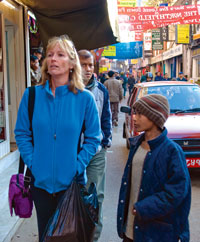|
|
In the day your plane lands at Kathmandu airport and an obnoxious taxi driver in an antique car charges you a fortune to dump you in the middle of its urban chaos, you quickly learn to navigate Thamel.
It's like snakes and ladders. Whatever your destination, and however close, a series of obstacles will hold you up. You have to walk very briskly, look down and skirt teeming humanity. There are the drug dealers offering you pot, fruit vendors with their one-dollar-a-piece apples, rickshaw drivers, touts who pretend you've met before and try to talk you into going on a trek with their agencies.
Each time you hesitate and stop, you slip back a few squares. Then there are the ragged ladies shaking empty baby bottles, the kids begging for biscuits, the guy with the mini-chess set, tiger balm, flutes, sarangis. If you are scared of reptiles, then you might also have to cross the road to avoid walking next to a snake charmer petting a two-metre python.
|
|
But all that is Thamel for beginners. Once you've learned a few tricks, dodging the hurdles are a piece of cake. That usually happens when you return to the capital from your trek in the mountains. First, you will be able to wrench your eyes away from the potholes and multitude of wheels racing in all directions, threatening to amputate your feet. You will start noticing the souvenir shops, cafes and restaurants that you had previously ignored, choosing to dive into the closest bakery before rushing back to your guesthouse, all limbs intact. Finally slumped on a soft cushion in front of a sizzling steak with pommes frites, you'll observe the ecstatic, slightly daft smile on the faces of emaciated fellow trekkers returning from a three-week diet of muesli bars, instant noodles and dal bhat.
That's when Thamel becomes a culinary Shangri-La where you'll be flabbergasted to find apple strudel that challenges its Viennese counterpart, pizza that tastes exactly like in Rome and better hummus than in Casablanca. In your memories, Kathmandu is bound to become the place where you had the best food ever. As in Pavlov's experiment, the word Thamel will trigger a conditioned reflex that will make your mouth water.
|
|
But there is also an advanced Thamel, which needs to be read between the lines, examined against the light like a watermark. It's one the vast majority of tourists never get to see, even though they are walking in the midst of it every day. It's the Thamel of mushrooming massage parlours and dance clubs where prostitution is rife, of street children sniffing glue out of small plastic bags, of young pimps in search of western ustomers for a snotty bunch, and of pre-teen boys wearily trotting along.
There's a few Nepali men staggering in the middle of the road, staring into the void, their bodies and minds devastated by brown sugar. And finally there are scores of kind-hearted travellers who, despite the clear directions given by the Lonely Planet, buy street kids and beggars something to eat or a little present, perhaps ignoring that most of the time things will be returned to the shops or sold on to someone else to raise some cash.
If you observe people on the main Thamel road from a first-floor bar, you will see some of these happening at any given time. "Thamel is killing itself," says a long-time resident. "Will tourists really want to come to a place like this?"
Maybe they will. Two attractive young girls in bright saris get off a taxi on the street below. They walk quickly into a massage shop.
Congestion in Thamel is a sign of a tourism rebound, but not everyone is happy
|
|
Touts and beggars, coupled with congested traffic make navigating in Thamel a challenge in itself. During peak hours, walking the 100m stretch into Thamel can take up to 10 minutes. Yet, businesses at Thamel go on as usual.
Prakash Karmacharya of Typical Handloom Weavers, a fabric exporter, says there hasn't been any noticeable change in his business in the past five years despite the worsening congestion.
Sales in some stores have even picked up. The Paper Park, which sells handmade stationery goods, has seen business boom in the past year. "It seems that political instability creates more problems than traffic," says Bhupal Raj, who runs the store.
Businesses in Thamel took a dive after Nepal's tourism collapsed when the conflict intensified in 2001. But with things now on the rebound, Thamel is bustling again. And for many in Thamel the congestion itself is a sign that business is picking up.
But tourism officials and Thamel hotel owners realise that Kathmandu's tourist hub may be the victim of its own success. The Thamel Tourism Development Council is liaising with business owners and entrepreneurs to improve traffic and chase out touts.
Thamel's new traffic regulations include issuing special passes to vehicles, such as those belonging to hotels, which will allow them to enter areas cordoned off by security guards. This month, the council will be setting up roadblocks to test the feasibility of the plan.
"Traffic here is crazy, cars are bumper to bumper," says Korean backpacker Kim Seung Wook who has been grazed several times by side mirrors of whizzing motorcycles. Kim has even been spat upon by storeowners whom he rejects.
Other tourists buttonholed outside Kathmandu Guest House agreed. "It's not a relaxing place," says Sjors and Herman, both from Holland, who have been in Nepal for two months. On one side of the road, drug dealers whisper their wares. On the other side, street children beg for money.
Most tourists interviewed said that they did not respond to the children's pleas. "We choose to ignore them because we are aware that there are shelters available, and these children had been given a choice for a better life," says Herman.
Storeowners in Thamel sympathise with the tourists and are determined to clean up the area's image. "The touts, beggars and children leave a bad impression on visitors," admits Richa Maharjan of Pilgrims Book House.
Once the Council's plans go into effect, vehicles will not be the only ones experiencing limited access. Mobile fruit-sellers will be given passes and will only be allowed to sell at allocated places.
"We are also hoping to keep away the street children through these barriers," says Namgyal Lama, who heads the Council. Lama expects a more pleasant Thamel where pedestrians can walk without fear of being hit by motorcycles and harassed by beggars. The shops and cafes would benefit as more people are attracted by the ambience.
But when that happens, some say, the fun will be gone. Thamel just won't be Thamel without its chaotic streets.
Wong Shu Yun, Sheere Ng






